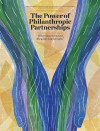Kinko’s founder Paul Orfalea was well into his career when he and his wife, Natalie, experienced the tragic loss of their first child in infancy. The loss traumatized both parents, but it also opened their eyes to the physical, emotional, and social challenges that new mothers endure. A successful entrepreneur with energy, passion, and financial resources, Paul began to champion workplace daycare, lactation education, and the creation of lactation centers on college campuses and in other public buildings. Then, in 2000, he and Natalie launched the Orfalea Family Foundation and, in 2003, The Orfalea Fund.
The Power of Philanthropic Partnerships

This special supplement looks closely at the lessons the Orfalea Fund has learned about how to create effective partnerships with nonprofits, government agencies, and other philanthropies.
-
“Where Two Rivers Meet, The Water Is Never Calm”
-
Migrating a Partnership Ethos
-
The Pillars of Partnership
-
Accepting the Challenges of Partnership
-
Valuing Stakeholders in Early Childhood Education
-
Early Lessons Propel a Movement
-
Building Disaster-Ready Philanthropy
-
Strengthening Santa Barbara County’s Disaster Resilience
-
Choosing the Right Partners for School Food Reform
-
A Changing Landscape for School Food
-
Lessons From a Sunsetting Fund
-
When to Lead, Follow, and Let Go
-
The Gates of Hope
By that time, they had spent a lot of time in childcare centers. As Paul remembered, “The directors in those centers were just like our store managers; they were working at a frenetic pace, and each was doing something others could learn from, but they were isolated. There was no inherent network where they could share best practices they were discovering.” Not surprisingly, then, one of the fund’s first actions was to launch a series of Children’s Center Director Retreats, bringing early childhood educators from Santa Barbara County preschools together into a network that had never before existed. The events offered inspiration, education, and camaraderie in a stress-free, resort setting. (Is it a coincidence that the county’s preschools now achieve national high-quality accreditation standards at eight times the state rate? I don’t think so.)
The fund’s impulse to partner, convene, and appreciate is a carryover from Kinko’s unusual corporate culture, which was anchored by a very public set of company values known as Kinko’s Philosophy and Commitments to Communication. These values embraced an entrepreneurial compulsion for reinvention, and a partnership ethos driven by a passion for democracy. The company (sold to FedEx Corp. in 2004) aspired to treat each stakeholder—coworker, vendor, customer, and community—as a citizen with a full voice in the enterprise, and it expressed that aspiration through mentorship, profit sharing, and participation.
At the fund, those values similarly created a culture where staff members rolled up their sleeves and worked alongside partners, to better understand and develop each party’s strengths. Staff members mentored grantees, and the fund also brought internationally renowned experts to the community to share their knowledge. While all philanthropy might be considered “profit sharing,” The Orfalea Fund took an extra step, issuing “staff grants,” so that each team member might select his or her own grant recipients. And participation has been apparent in events such as the Children’s Center Director Retreats, an annual School Wellness Summit (which brings together stakeholders including food service workers, superintendents, teachers, and parents), and the fund’s Aware and Prepare disaster preparedness initiative. (These events, in fact, were explicitly inspired by the Kinko’s Picnic, a week-long annual meeting that was part trade show, part training conference, and part family and coworker reunion.)
The Orfalea Fund’s impulse to partner, convene, and appreciate is a carryover from Kinko’s unusual corporate culture and very public set of company values.
The company Philosophy included this reference to its partnership ethos: “We develop long-term relationships that promote mutual growth and prosperity.” In the fund’s early years, that same commitment manifested itself as an entrepreneurial enthusiasm for encouraging grantees to dream big. Grant applications asked prospective recipients to describe what they would do with twice or even ten times as big a grant as what they were seeking, and when many applicants struggled to respond, their difficulties led foundation staff members to offer ideas, try new things, and strive to be audacious for a greater end result.
Even when the fund launched its own initiatives in the areas of school food reform, disaster readiness, early childhood education, and youth development, that same commitment to the idea of mutual growth and prosperity was clear. The fund has always been a limited-life entity, and with that in mind, staff members have been purposeful about creating partnerships to ensure that their initiatives would not only survive, but thrive well beyond the fund’s involvement. They sought to bake the partnership ethos into relationships that will provide continuity for the Orfalea family’s philanthropic vision, even as the family moves on.
Entrepreneurs who move into the realm of philanthropy often bring with them a desire for a businesslike approach to giving. The experience of The Orfalea Fund reminds us that there is more to a business than its policy manual and balance sheet. A culture that prioritizes human relationships and cooperative solutions can bring out the best in everyone it touches.
Support SSIR’s coverage of cross-sector solutions to global challenges.
Help us further the reach of innovative ideas. Donate today.
Read more stories by Dean Zatkowsky.

